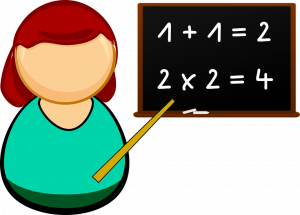Mathematics difficulties could be attributed to three factors. Primarily, external factors related to social problems, the family’s social economic profile and frequent absences from school. Subsequently, problems arising from the school environment, such as incorrectly structured curricula or poor teaching, could also cause a sense of inadequacy in mathematics. Finally, mathematics difficulties may be due to internal factors, such as specific learning disorders.
According to the DSM-V, the difficulties that students with specific learning disorder in mathematics can be identified in understanding numbers, recalling numerical facts, performing numerical calculations, as well as in mathematical reasoning ability. It is a neurodevelopmental disorder of biological origin that occurs in the early school years and is not due to mental disorders.

The most common symptoms of mathematics difficulties are the difficulty of measuring, the persistence of counting with the fingers, the inability to learn mathematical concepts such as formulas, theories, times-table, and the difficulty of estimating quantities. Students with mathematics difficulties find it difficult to follow specific steps to solve structured arithmetic problems. In addition, they have trouble understanding the concepts of positive and negative numbers as well as the representation of a number in the mental number line.
